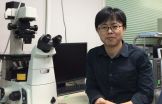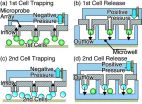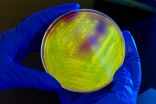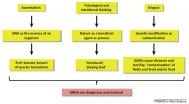(Press-News.org) Functional analysis of a cell, which is the fundamental unit of life, is important for gaining new insights into medical and pharmaceutical fields. For efficiently studying cell functions, it is essential to reconstruct cellular microenvironments by parallel manipulation of single cells. Various cell manipulation techniques including fluidic, optical, and electrical techniques have been developed.
However, all these techniques lack flexibility with respect to changes in the cellular types, number, and places. In addition, the manipulations, which have been conducted in enclosed environments such as micro-channels, have limited access to the cells. It would be ideal if the working of a manipulation tool is analogous to grasping and transporting cells by one's fingers.
Now, researchers at Toyohashi Tech, at the Department of Mechanical Engineering, have developed a novel cell-manipulation tool that can trap and release single cells in a parallel arrangement in open-top microwells. The researchers fabricated an array of hollow microprobes to improve throughput and achieve flexibility in single-cell manipulation. The microprobes work like micro fingers picking up human cells. Single cells were trapped by suction and released by a flow generated through microchannels along the center of the probes.
"Parallel and versatile cell manipulation tools are essential for biomedical innovation", said Assistant Professor Moeto Nagai. "Microfabrication technologies offer massively parallel microstructures close to a human cell in size," he said.
"We fabricated an array of hollow microprobes with designed diameters, heights, and numbers from a silicon substrate using microfabrication techniques. Single cells were trapped on the tips of the probes using a suction flow. The cells were then released and placed in an array of microwells," Nagai said.
The research team developed a design principle for probes for minimally invasive single-cell manipulation. They conducted a cell aspiration experiment with a glass pipette and modeled a cell, thereby gaining information for designing hollow stepped probes. Based on the findings, the researchers designed and fabricated optimal probes. After a process of trial and error, the cells were placed and cultured in microwells with the probes, and the cells continued to maintain cell activity.
The proposed manipulation system makes it possible to place cells in a microwell array and observe the adherence, spreading, culture, and death of the cells. This system has the potential to be used as a tool for three-dimensional hetero cellular assays. In the future, this system will be further developed to reconstruct microenvironments of stem cells outside a living body, which would aid studies on stem cells for regenerative medicine.
INFORMATION:
Reference:
Nagai, M., Oohara, K., Kato, K., Kawashima, T., and Shibata, T. (2015). Development and characterization of hollow microprobe array as a potential tool for versatile and massively parallel manipulation of single cells, Biomedical Microdevices, 17(2):41.
doi: 10.1007/s10544-015-9943-z.
Further information
Toyohashi University of Technology
1-1 Hibarigaoka, Tempakucho, Toyohashi, Aichi, 441-8580, JAPAN
Inquiries: Committee for Public Relations
E-mail: press@office.tut.ac.jp
Toyohashi University of Technology founded in 1976 as a National University of Japan is a research institute in the fields of mechanical engineering, advanced electronics, information sciences, life sciences, and architecture.
Website: http://www.tut.ac.jp/english/
While seeking targets to attack Huntington's disease, an incurable inherited neurodegenerative disorder, neurobiologists of the research group led by Professor Erich Wanker of the Max Delbrück Center for Molecular Medicine in the Helmholtz Association found what they were looking for. Using a filtering strategy borrowed from criminologists, the researchers systematically filtered interaction networks of various biological databases. In several steps, they increasingly narrowed down their search until they ultimately found the protein (CRMP1). In subsequent lab experiments ...
Dropping off a child at kindergarten for the first time can be one of the most memorable yet terrifying experiences of parenthood. Among the many concerns parents face is the worry whether your child will make friends - a key factor, research shows, in reducing anxiety, depression and the likelihood of being bullied.
For parents of children with disabilities, the concern is even greater as four-out-of-10 of their children will enter kindergarten without the social skills necessary to develop close friendships. The response from schools has been to create inclusive classrooms, ...
A new technique that identifies how genes are controlled could help scientists spot errors in the genetic code which trigger disease, a study suggests.
The method focusses on those parts of DNA - known as enhancer regions - which regulate the activity of genes and direct the production of proteins that have key functions within the body.
Errors in protein production can result in a wide range of diseases in people, researchers say.
The new method could help researchers pinpoint the source of disease-causing mutations in enhancers. Until now, these genetic errors ...
ANN ARBOR, Mich. -- Nearly half of American hospitals aren't taking key steps to prevent a kind of gut infection that kills nearly 30,000 people annually and sickens hundreds of thousands more - despite strong evidence that such steps work, according to a new study.
While nearly all of the 398 hospitals in the study use a variety of measures to protect their patients from Clostridium difficile infections, 48 percent haven't adopted strict limits on the use of antibiotics and other drugs that can allow the dangerous bug to flourish, the researchers report.
Hospital ...
This news release is available in German. The world is a risky place. But our subjective fears and anxieties are often at odds with the evidence. New findings by scientists at the Max Planck Institute for Human Development and the University of Konstanz show that subjective fears about potential risks may be amplified in social exchange. Their findings have now been published in the journal Proceedings of the National Academy of Sciences (PNAS).
In our information society, information about risks such as Ebola and measles can spread like wildfire - be it through ...
A team of Belgian philosophers and plant biotechnologists have turned to cognitive science to explain why opposition to genetically modified organisms (GMOs) has become so widespread, despite positive contributions GM crops have made to sustainable agriculture. In a paper published April 10 in Trends in Plant Science, they argue that the human mind is highly susceptible to the negative and often emotional representations put out by certain environmental groups and other opponents of GMOs. The researchers urge the general public to form opinions on GMOs on a case-by-case ...
DURHAM, N.C. -- Orphaned children in low- and middle-income countries face a high risk of trauma, with physical and sexual abuse being by far the most prevalent traumatic events.
New research shows that orphaned boys in these settings are just as likely to experience abuse as girls. As a result, the study authors suggest targeting more support services and prevention programs toward protecting vulnerable boys.
Researchers from Duke University and the University of North Carolina at Chapel Hill found that physical and sexual abuse affects 12 percent of girls and 14 ...
Thinking "time is money" can be a barrier for people to act in environmentally friendly ways, even for tasks like recycling that take mere seconds, according to UBC research.
As Earth Day approaches on April 22, this dynamic has led to an unsettling outcome.
"Putting a price tag on time leaves individuals to focus on their own needs and goals, as opposed to the needs and goals of others, including the environment," says Ashley Whillans, PhD student in UBC's Department of Psychology and lead author of a paper on the subject.
In one of the paper's studies, a group of ...
The gold standard for analyzing the behavior of fusion plasmas may have just gotten better. Mario Podestà, a staff physicist at the U.S. Department of Energy's Princeton Plasma Physics Laboratory (PPPL), has updated the worldwide computer program known as TRANSP to better simulate the interaction between energetic particles and instabilities - disturbances in plasma that can halt fusion reactions. The program's updates, reported this week in the journal Nuclear Fusion, could lead to improved capability for predicting the effects of some types of instabilities in future ...
Negative feedback can sting, but thinking about the big picture may help transform criticism into positive change, according to new research published by the Society for Personality and Social Psychology.
"People are defensive when they are told about something they did wrong," said lead researcher Jennifer Belding, Ph.D., from Ohio State University. "Listening to negative feedback requires self-control because you have to get past the fact that hearing it hurts and instead use the information to improve over time."
In three experiments, researchers found that ...





